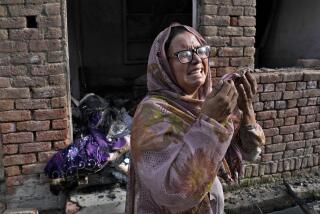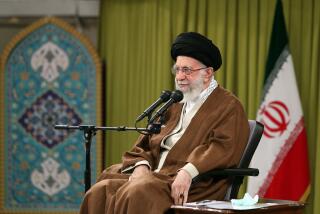India court sentences 31 people to life terms for killing Muslims
Reporting from Raebareli, India — A special court in India sentenced 31 people to life in prison Wednesday after convicting them of killing dozens of Muslims during communal riots in the western Indian state of Gujarat nine years ago.
An additional 42 of the mostly Hindu defendants were acquitted for lack of evidence.
The convictions, on charges of murder, attempted murder and arson, involved the deaths of 33 Muslims who were burned in a building as they tried to escape a raging mob. Twenty-eight bodies were found at the scene and five people died later of their injuries.
“This is a great verdict in the history of combating communal violence in India,” said R.B. Sreekumar, who was director-general of the Gujarat police intelligence bureau at the time. “There were reports that the Indian system is failing by not protecting minorities, but this is a healthy outcome.”
The 2002 communal riots, including this deadly house burning, were among the worst in recent Indian history. The catalyst was a train fire on Coach S-6 of the Sabarmati Express passenger train Feb. 27 of that year in which about 60 people, mostly Hindu pilgrims, died.
Muslims, blamed for the fire, were then targeted by Hindus bent on revenge. During three days of rioting, more than 1,200 people, mostly Muslims, were killed.
Some analysts saw a larger class message in Wednesday’s court decision.
Teesta Setalvad, a social activist based in Gujarat, said this decision — involving mostly poor laborer victims and higher-class accused — sends a message that the rich can’t always get their way. “The laborers got justice,” she said.
Human rights groups have accused Narendra Modi, the top elected official of Gujarat, of tacitly supporting Hindu mobs in the 2002 attacks on Muslims.
Modi, a Hindu nationalist in the opposition Bharatiya Janata Party who is seen by some as a future prime ministerial candidate, has repeatedly denied the accusations.
The case involving the convictions and sentencings Wednesday is one of nine being scrutinized by the Special Investigation Team set up in 2009 at the behest of India’s Supreme Court, and the first in which a decision has been reached.
Although there are about 2,000 cases related to the Gujarat rioting slowly working their way through the courts, these nine are among the most closely watched.
The court action Wednesday in the Gujarati city of Mehsana came after the sentencings by a special court in Gujarat in March of 31 Muslims found guilty of setting fire to the Sabarmati Express train that sparked the interreligious killings. Eleven were given death sentences and the other 20 got life in prison, with 63 additional defendants in that case acquitted.
Responsibility for the train fire has been the subject of fierce dispute between Hindus and Muslims. In recent years, however, analysts say, expanded wealth and greater political maturity have reduced the risk of communal rioting.
“I don’t think there will be any tension between Hindus and Muslims,” said Dushyant Dave, a senior Supreme Court lawyer. “Even majority Hindus should draw a sense of satisfaction. No one wants to be associated with criminals, after all.”
Tanvi Sharma in The Times’ New Delhi bureau contributed to this report.
More to Read
Sign up for Essential California
The most important California stories and recommendations in your inbox every morning.
You may occasionally receive promotional content from the Los Angeles Times.










